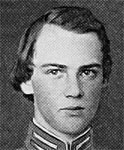 Open main menu
Open main menu
 Open main menu
Open main menu

W.McK. Clark
(1846 - 1924)
Home State: North Carolina
Education: University of North Carolina, Class of 1864;Class Rank: 1st
Command Billet: Regimental Adjutant
Branch of Service: Infantry
Before Sharpsburg
From a wealthy family, Clark was a cadet at the Hillsboro Military Academy (Colonel Tew) in North Carolina when, in June 1861, at age 14, he joined the 22nd Regiment as drill master, and saw duty in Virginia. In November he was acting Adjutant of the 35th as it was organizing. When the regiment deployed for action, he returned to school in Hillsboro.
Adjutant Nelson resigned in July 1864 and Clark was appointed to replace him. He joined the 35th Regiment at the start of the Maryland Campaign.
On the Campaign
He was with the regiment on Loudoun Heights during the siege of Harpers Ferry, and in action at Sharpsburg on 17 September where he was slightly wounded in the hand, and where ...
"... Lieutenant-Colonel E. A. Palfrey, of the Nineteenth Massachusetts, and two other officers, were captured by Adjutant Clark and Lieutenant (after wards Captain) S. G. Howie, of Company F..."
The rest of the War
He was also at Fredericksburg in December. When his Brigade went back to North Carolina in February 1863, he resigned and attended the University of North Carolina. He graduated at the top of his class in 1864.
The day after graduation, he was elected major of the Sixth Battalion, North Carolina Junior Reserves (3 June 1864). He became Lieutenant Colonel of the Seventieth Regiment when the 6th battalion was joined with First to form that regiment (4 July 1864). On later reorganization, he was elected Major - and served at that rank for the rest of the War, in North Carolina.
After the War
He ran his family's plantations in Halifax County and near New Bern, and studied the law in New York and Washington DC (Columbia). He began his legal practice in Halifax in 1867. He moved to Raleigh in 1873 where continued in the law, ran a newspaper (Raleigh News), and was a director and counsel for the Raleigh and Gaston and the Raleigh and Augusta railroads.
He was appointed (later reelected) Superior Court judge in 1885, and to the state Supreme Court in 1889. He was appointed Chief Justice in 1903 and served until his death - a total of more than 34 years on the Court. He became a progressive reformer who advocated for the rights of women and former slaves, and was noted for challenging big tobacco, railroads, and other monopolistic businesses. He received votes for US Vice President at the Democratic National Convention in 1896, and was an unsuccessful candidate for US Senator in 1912.
He wrote a number of significant books of law, history, and biography, and is perhaps best known today for Histories of the Several Regiments and Battalions from North Carolina in the Great War, 1861-1865 (1901).
References & notes
War details from Clark's own Histories1, also source of his photograph. Further details from the Dictionary2 as posted online by UNC.
Birth
08/19/1846; Halifax County, NC
Death
05/20/1924; Raleigh, NC; burial in Oakwood Cemetery, Raleigh, NC
1 Clark, Walter, editor, Histories of the Several Regiments and Battalions from North Carolina in the Great War, 1861-1865, 5 vols., Raleigh and Goldsboro (NC): E. M. Uzzell, Nash Brothers, printers, 1901, Vol. 2, facing pg. 591, 598, 603, 606; vol. 4, pp. 9 - 22 [AotW citation 1035]
2 Powell, William S., ed., Dictionary of North Carolina Biography, 6 vols., Chapel Hill: University of North Carolina Press, 1979 [AotW citation 1036]